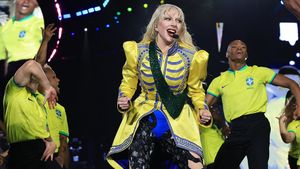Broadway was only
four days into a strike in 2003 when New York City
mayor Michael Bloomberg pressured both sides to come
together and warned of the looming ''severe economic
impact'' that could result from the dispute.
This time,
theaters have been dark for more than a week and the mayor
is not only refraining from wagging his finger in
public, he's downplaying the potential damage the
stagehands strike could cause the city and shrugging
off some of the concerns he voiced four years ago.
The losses, he
said Monday, are mostly contained to the theater industry,
and theatergoers counting on Broadway shows may be
disappointed. Otherwise, it's hard to quantify any
sort of economic setback, and life goes on, he said.
''I think what it
hurts more is our reputation, and it's the psychic
things rather than dollars,'' he said. ''Our hotels will
still be full, our restaurants will still be full,
mass transit will still be going along.''
Estimates of the
economic damage to the city vary wildly, ranging from $2
million to $17 million a day. Bloomberg, a billionaire
businessman, dismissed any such figures as
''guesswork'' and said the sky is hardly falling.
''Is it a
cataclysmic thing for this city? No. Is it bad for this
city? Yes,'' he said.
Talks broke off
Sunday between Local 1 and the League of American
Theatres and Producers, and performances for more than two
dozen Broadway shows were canceled through November
25, the lucrative Thanksgiving holiday weekend.
Pressure has
mounted for a solution to the work stoppage, which began
November 10, because this is typically one of Broadway's
best weeks of the year. Many shows top more than $1
million for the week.
The stagehands
-- who include scenery and prop handlers, carpenters,
electricians, and lighting and sound technicians -- have
been working without a contract since the end of July.
Negotiations have focused on how many stagehands are
required to open a Broadway show and keep it running.
The shows idled
by the strike include some of Broadway's biggest hits,
including Wicked, Jersey Boys, The Phantom of the
Opera, The Lion King, and Mamma Mia!
Eight shows whose
theaters have separate contracts with the union remain
unaffected by the walkout. They include four productions
playing at nonprofit theaters -- Pygmalion, The
Ritz, Mauritius, and Cymbeline -- and
four other shows: Young Frankenstein, Mary Poppins,
Xanadu, and The 25th Annual Putnam County
Spelling Bee. All off-Broadway productions are open
too.
Bloomberg was in
his first term when Broadway last shut down four years
ago. That time, he was more publicly forceful in urging the
two sides to come together, and when they accepted his
offer of a neutral mediator and place to meet, he even
showed up at 3 a.m. to urge them on. A deal was
announced hours later and the curtains went up that night.
There are a
number of possible explanations for his more low-key
approach to this strike.
In the first
dispute, the theater producers had somewhat of an upper hand
over the musicians because there was the threat that the
shows could go on without them, using recorded music.
For this reason, Bloomberg might have wielded more
influence when he called both sides to get together,
because if the union didn't show up, they risked letting the
producers win with canned music.
There is no such
power play in this year's standoff. Aides say Bloomberg
believes that the same public pressure that worked four
years ago is not the right approach this time around.
Joshua Freeman,
professor of labor history at Queens College, said
Bloomberg also might be standing back because the two sides
are farther apart and he believes his attempts could
fail.
''Some of it is a
recognition that he has relatively limited leverage,''
Freeman said. ''These are private parties, and he may prefer
not to stake out a position as a problem solver if he
doesn't think he can solve a problem.''
But City Hall is
still involved, however quietly; Bloomberg and his
deputies are regularly in touch with both sides, as well as
labor experts. The mayor was also quick to have dinner
at a theater district restaurant after the strike
started, in a symbolic move to show that the area was
still open for business. (AP)














































































